- Home
- Richard Matheson
Created By Page 3
Created By Read online
Page 3
Andy stared into nowhere. “And your show?”
“My show, ‘The Mercenary,’ entertains the hell out of them with enough action and blood to compete with Segal, Norris, Schwarzenegger. They don’t have to rent Die Hard 7, ’cause they can watch better every week. My guy doesn’t take shit, doesn’t take prisoners, and this show is gonna get ’em outta the theaters and VCR rental joints, back in front of the goddamn set where they belong.”
Alan moved eyes from face to face. Andy’s buzzer sounded and he turned from the window.
“Hold all calls.”
Andy stared at Alan, saying nothing; mind lining up crosshairs. “Alan … I gotta tell you, I don’t know, man. You’re making some real good points and all that and what you’re talking about might—I stress might—pull an audience away from our competition.” Andy sounded sincere for the first time in the last ten minutes. “But we haven’t got a chance with the direction you wanna take. I mean, we aren’t doing features. You’re talking Joel Silver time. FCC would close us down.”
“Let them sue you. Tie ’em up in court for ten years waiting for a trial. If the affiliates are happy, you’re making money. I’d rather be in litigation than broke, wouldn’t you?” Alan stared out the window, again. “Andy, I’ve seen the annual reports on your profits. You guys need something other than a Jim Brooks syndication package. Getting grim.”
Andy said nothing. The Kewpie who looked like a nose in clothes cleared his throat; offered wisdom.
“He’s right, Andy. Last year was a … fall-off.”
Andy didn’t glare. No repudiatory sulk. No arrogant pout. No power-tripping sarcasm. No argument of any kind. He knew it was the truth. The network was hanging by a finger. So were the other two networks. Maybe FOX, too, with or without Bart Simpson. Cable had cut off everybody’s balls and left them to slowly bleed to death, ratings pooling; a hemorrhaging attention span.
They needed something.
All the programmers talked about it among trusted advisers and friends. It was time to start taking huge risks. Blow the lid. Stop firing rubber bullets. Something that would hit like a fucking Amtrak crashing through your forehead at three in the morning and didn’t cost a fortune. And if the sponsors didn’t like it, get new ones. Besides, thought Alan, all Variety ever talked about was the sponsors moving to off-network. They had no fucking loyalty. They had abandoned the networks, forcing them to unravel the whole mess.
How many were leaving?
Enough to wipe the chalk right off the scheduling board. Millions of dollars invested in pilot episodes. Presentations. Holding deals with stars. Staged readings. Preproduction costs. Postproduction costs. You-name-it-it-costs-something costs. It wasn’t home movies they were discussing here. It was enough money to run a country.
And the awareness of that made Andy’s face a tight drumhead; tension stretching his features flat. He tapped half-digested nails against the desk. It was impossible to imagine what might be coursing through that strangely empty mind. The Kewpies shifted restlessly. Alan said nothing, swallowed by his big chair. Andy liked all the silence. It gave him the leisure seconds to formulate his closing thoughts. Which were most often identical to his opening thoughts.
“How much do you have?” It was a tone Alan knew; the sound of scented blood, of Andy’s interest in a state of growing erection.
“The characters, basic bible. Ten or fifteen springboards. Pretty clear direction for a two-hour pilot.”
Alan knew he only had half that but it wouldn’t be hard to fill it in. He was already playing with an opening sequence for the pilot that involved a crashed British Airways 747, on the bottom of the Atlantic, filled with trapped passengers; entombed, screaming. Exactly the kind of hypnotic trauma that should become the show’s insignia.
He was starting to get a twinge of something.
Even the Kewpies were looking into his eyes every second or so. They did that when they felt their boss responding. It gave them the freedom to look at you, with the confidence they weren’t staring at failure. They hated that. Failure was worse than death. Worse than original sin. And when they saw maybe you weren’t a sinner, they wanted to get a good look at you. They wanted to see what living forever looked like.
And when a show stayed on, that’s what happened. If it could survive sixty-six episodes, enough to syndicate, not only did everybody including the creator get crazy rich, the show could run forever. They said that somewhere in the world Richie and Fonzie were sucking malts, twenty-four hours a day. With the right show, you never had to die.
“Alan … I think our chances are like a hundred million to one … and we may all be sharing a plug-in chair … but I don’t know. It’s real different.”
Alan smiled. “I can play with the tone a little. But I wanna make it hard-core. Make what Mann was doing with “Miami Vice” look like Police Academy, you know?”
“It’s weird,” said Andy. “I haven’t felt this—whatever I feel—since I heard the pitch for ‘Cleo.’ I’m getting that … it’s hard to describe.”
Lettuce is hard for you to describe, thought Alan.
“Anyway, I’ll take it to Greg and Scot, see what kind of reaction I get. I mean, with the FCC thing … I’d say we’re dead meat. But it might crack ’em up.”
“We’ll certainly get an interesting reaction,” said one of the Kewpies with robust participation.
The black lady Kewpie also spoke.
“This kind of an idea could be a real breakthrough, Andy. If done right, of course.”
Andy nodded half interest at their contributions; he looked off. “You know, ever since ‘Cleo,’ it’s hard to get excited with ideas. You get spoiled.” He sighed, then brightened. “Hey, Alan, how’s your racquetball game these days?”
“Good as ever. Terrible.”
As soon as Andy chuckled, everyone else did. It was strange, thought Alan. Hearing sounds of happiness issuing from Andy’s denuded soul. As if he were some kind of satanic muppet. Andy stood and everyone did.
“Look forward to hearing from you.” Alan was shaking hands.
“Right,” said Andy. “I’ll call Jordan or Anna, if I can’t get you. I like them, by the way. Terrific agents.”
Alan nodded, knowing the network was in bed with half his agency’s projects. Everything was packaged so far ahead of time, the agent/network Siamese twin fusion was the thumb-screw carburation that made stuff go. It was simple greed-math; half charm, half ransom note. When the agency wanted the networks to buy a pilot script they represented, the script was positioned to include one or more of the agency’s stars, producers, and directors. In an ideal scenario, it had everything the networks wanted and became an irresistible juggernaut the agency controlled; like the names of powerful johns in a madam’s scheduling book.
Then, the bully pulpit made two really big fists; if the network wanted to be first in line to bid on the project, they had to give the agency a decent order and time slot. It was more than mere mutualism. It was chic blackmail.
They were at the door.
“See much of Eddy anymore?” asked Andy.
Alan didn’t think Andy even knew Eddy. He’d been Alan’s writing mentor and one of the best all-around writer-producers Alan ever knew. But he pissed all over his own fire with too much Jack Daniel’s and Llama talc. Missed deadlines, got in too many fights. Threw it all away. Now he was in Cedars basically waiting for his remaining healthy cells to up and hit the high road. It was inevitable and Eddy knew it.
Alan called as often as possible, saw him at least once a week. But it was getting harder. The drugs they chlorinated him with made him crazy. Even though they stunned the pain, chemo had sculpted him down to a sickly Lincoln doll and Alan could barely handle it. A guy’s hero deserved better. A guy’s enemy deserved better.
“You two ever work together?” Alan asked.
“Once. He fucked-up an M.O.W. we worked on together when I was at Metro,” said Andy. “I hear he’s dying. Too bad. We all g
et cancelled sooner or later.”
Yeah, thought Alan as he left and walked around on Melrose to clear his head.
Sooner or later.
setting
The house drowsed above sea, groggy perfection.
It had been built in the fifties and the real estate agent, a blond bayonet, bloused in Claiborne, told Alan previous owners had included a neurosurgeon, a famous mystery novelist, a feminist lawyer who once punched Dick Cavett in the nuts, and a witless, top-forty-hit-derrick who wrote a song called “Sunshine Lady.”
The current owner had been aboard the brain trust that invented those big cardboard things you put in your windshield to block the sun. He was currently in the T-shirt racket and worth over twenty million give or take a cotton blend.
Alan walked around admiring the breathtaking view, hearing waves sledge shore. He passed leather sofas, carved African masks, and framed T-shirt business awards. Started humming “Sunshine Lady,” a cloying, kindergarten melody he’d always hated. It was about a perfect girl, with a perfect “sunrise smile” and how she was mysteriously abducted by an exquisite sunset that just couldn’t resist her shiny teeth. It had made the top ten in ’82 but got bumped by Melanie’s “I’ve Got a Brand New Pair of Roller Skates”—a more complex achievment.
The place was exactly what Alan was looking for. Big, airy rooms, light-flooded, accented with white-washed trim. Huge decks off the living room and master, overlooking blueberry sea. There was a fireplace you could look through from both the living and dining rooms, a sandblasted ceiling. Glass blocks that stacked sunlight. It was tasteful, easy to be in. Almost a million. But the way things could go with the pilot, the new deal at Universal, money was coming fast. And he wanted a new place. A new atmosphere. Something different.
Something he couldn’t put his finger on.
“You like?” she was following Alan around. Lifting big sunglasses.
He didn’t answer, starting to remember something. An article he’d read, years ago. An item that evaded detail, tucked away in the back of Variety. About the … but it couldn’t’ve been this house. This house was too cheerful. If something like that had happened in a place, you’d still feel it. There would be a feeling; a nausea. The white walls would have a telltale pinkness here and there where the paint didn’t quite—
“Nice.”
“Gorgeous.” She had a lung-cancer laugh; struggling for sufficient oxygen. Lit a Virginia Slim, took out her calculator, and opened the sliding door, seeking deck sun. A refuge to do math.
Alan followed, leaned on the deck railing, instinctively smiled at the view. A family of porpoises was doing a smiley, slo-mo cruise through waves, yards off shore. As they traveled north, Alan kept staring, eyes losing focus. His mouth went dry as he imagined them being harpooned, silver skin bleeding, mouths screaming. The ocean turned to blood in his mind, an awful burgundy, crashing on sand.
“There may be another offer coming in this afternoon. Just so you know.” Her right foot tapped air.
Alan watched the dolphins writhing as the whalers laughed, pulling them closer to small boats. The young dolphins tried to stay with their parents, though the older ones frantically nosed them away to save them. The men had no faces, just smooth flat skin; slits for mouths. The mouths grinned, as arm muscles pulled harpoon ropes, and the porpoises were dragged through plasma, clubbed on the head. They struggled, making a horrible noise, and the sea churned, red foam.
Alan turned to her. Looked back at the perfect blue Pacific. A windsurfer scalpeling currents.
“The one who was a songwriter …”
She looked up, sharply. Down again at her calculator. Flicked an ash into a potted cactus.
“Did he live here in the seventies?”
Then, all at once, he remembered. The article, buried deep. The murders. The man and his wife tortured in a two-hour attack by a former band member he’d fired when “Sunshine Lady” hit. Alan remembered hearing about the details at a party, where the host, a famous TV star, was tight with LAPD.
The guy described detectives saying the couple was beaten, stripped naked, and nailed by ankles and palms to the bleached, wooden floor. The killer had taken two hours to crush their heads, ball-peening the skulls progressively harder until bone under bruised skin began to give.
The murderer later admitted that while they were still alive, begging him to call an ambulance, he’d found an electric knife in the kitchen.
He’d sawed all the way down the man’s sternum, slitting open skin and muscle, making crude scrimshaw on bone before moving the humming blade across to her. As her head shook from side to side, nipples were circled; cut off.
Then, more cutting and sectioning, finally sledding to legs, thighs, and tendons which were sawed into ruin. The murderer had testified later that it took half an hour to trash both bodies. The screaming had slowed things until he realized by cutting their larynxes he could work in relative peace.
When he was done, he took the desecrated bodies, placed them side-by-side on the master bed, resting on Ralph Lauren pillow shams, staring forward, waiting for the police.
“A murder …”
She said nothing.
She was lying; could tell Alan knew it. She looked at sun doing cut-crystal on ocean. “I think someone in the office mentioned there was a break-in at one point but that’s all I know. I got the impression it was years ago.” She smiled useless comfort. “Anyway, in L.A. it’s hard to buy a nice house that hasn’t had something. That’s why they invented alarms, right?”
Alan watched the porpoises steer around the small peninsula, continue north toward Malibu pier.
“I have a feeling they’ll let this go for nine twenty-five. The owner just bought in New York and he needs to be there full-time for business.”
He looked through the dining room window, at the wood floor. Tried to detect nail marks: holes or nicks, spaced far enough apart; spread-eagled scars on hardwood.
“I remember hearing about a murder,” he said, not looking at her. Drawn once again to the floor; the sacrificial trauma sponged in cracks and grooves.
“Would you rather look at something else? I have a couple listings up on Broad Beach that are to die for.”
To die for. He folded the phrase into smaller and smaller sizes until it disappeared.
“But I remember you saying anything beyond Zuma was too far north.”
He went back inside, trying to decide if he could live in a house where something so ghastly had happened. His mind saw things; that was always the danger. His feelings and perceptions could shift for no reason and inexplicably imagine terrible prospects in anything.
A mother pushing her baby on a sunny park day could suddenly change, in his mind, to a crying woman whose selfish husband was leaving to take the baby to another state, where it would be molested; murdered.
A smiling cashier at McDonald’s would become a crumpled statistic, victim of a gang drive-by which would strike exactly at the moment Alan was being handed his McNuggets. Exploding blood would puddle on the shiny metal counter.
The times he imagined people pulling alongside his own Porsche and shooting him. Or the times a windy night sounded like footsteps. Or the moment a neutral face at a mall became an abhorring glare that would follow him out to the parking lot and beat the shit out of him until he was bloody; begging for his life.
It was everywhere.
A voice on the phone, soliciting for Vets of Nam, who didn’t like him saying no, he “already gave six months ago.” The way he could see the voice break in to his apartment and wait, and he would open a closet late one night and it would plunge a knife into him.
The mention of his mother making him imagine her alone, inside her casket, pounding to get out, ripping at puffy satin, screaming helplessly, nails torn off as she struggled to claw free.
“Broad Beach is too far,” he said.
“Well, we can keep looking. There’s always new stuff coming out in listings.” She was lookin
g at Alan like he scared her a little. Like something about him was changing. She was studiously measuring what he needed to hear, watching carefully for reaction.
He looked at her.
Saw her getting old. More desperate than she already was. Saw diseases rooting. Saw all those who ever cared about her, pulling away and despising her frantic demands as she sat alone in a corridor in a depressing nursing home. Saw the sheet being pulled over her face, covering carefully bleached hair.
“Can I tell you something … don’t buy if it doesn’t feel right.” She smiled, teeth pressing brown lipstick. “We’ll find you something you’ll love.”
Alan watched waves spread champagne on sand, as the sun passed out. He felt overwhelmed, knew somehow, despite the house’s nightmare history, this was home.
Where he could create.
The wind came up, strumming chimes that hung on the deck, and he told her he wanted the house. It was the right atmosphere. He could be himself here. Was somehow even fascinated by residues of terror and helplessness that stared up at him from the floor. He didn’t know why. But he imagined himself kneeling on the wood, staring at it until blood seeped from the peg and groove; surfacing welcome. He imagined placing an ear to the dented wood, hearing tiny pleas.
She seemed surprised Alan wanted to go ahead with it and smiled quickly. “That’s wonderful,” she said. “I’m sure we can get this.” She touched his arm; financial foreplay. “We better write this before someone beats us to it.”
He said nothing, moving onto the deck, sounds of torture drenching his mind.
character
motivation
Paramount was tripping on adrenal fluid; a frantic operating room, filled with a fresh shipment of hopeful wounded: writers, actors, directors.
Projects.
Five shows in production, plus Jonathan Demme huddling with Eddie Murphy; the black interferon. Robin Williams and Kevin Costner were shooting a new John Hughes script about the discovery of cheese, or some such high-security rumor, and the whole lot was doing the Cape Kennedy, pre-launch rumble; Pachinko-hyper.

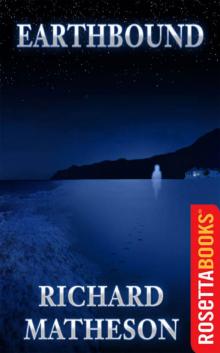 Earthbound
Earthbound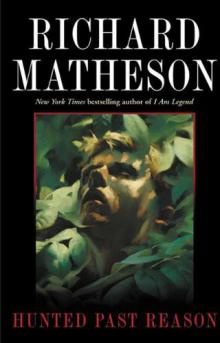 Hunted Past Reason
Hunted Past Reason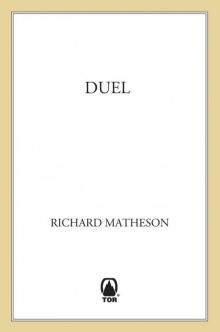 Duel: Terror Stories
Duel: Terror Stories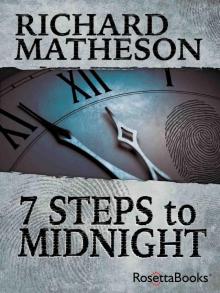 7 Steps to Midnight
7 Steps to Midnight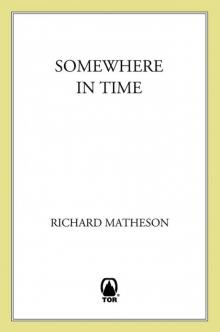 Somewhere in Time
Somewhere in Time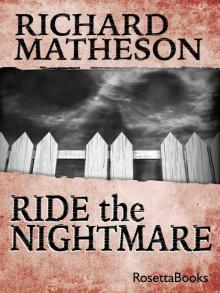 Ride the Nightmare
Ride the Nightmare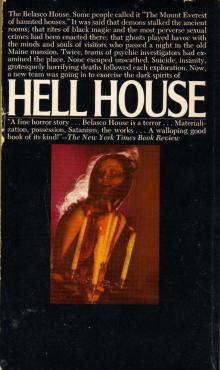 Hell House
Hell House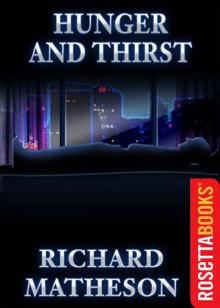 Hunger and Thirst
Hunger and Thirst Lyrics
Lyrics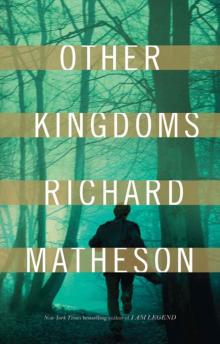 Other Kingdoms
Other Kingdoms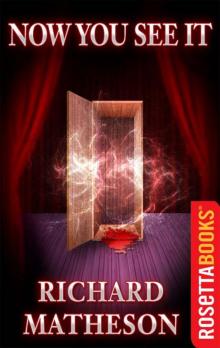 Now You See It . . .
Now You See It . . .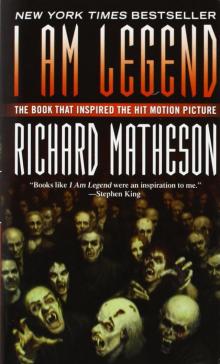 I Am Legend
I Am Legend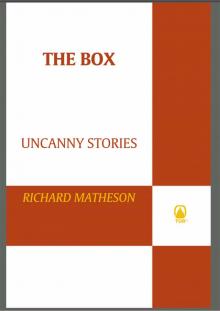 The Box: Uncanny Stories
The Box: Uncanny Stories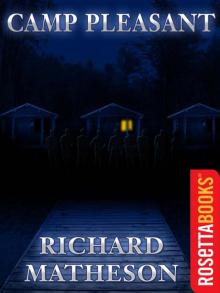 Camp Pleasant
Camp Pleasant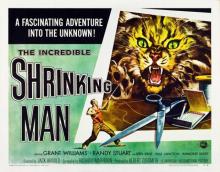 The Incredible Shrinking Man
The Incredible Shrinking Man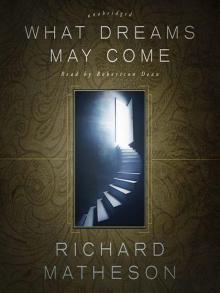 What Dreams May Come
What Dreams May Come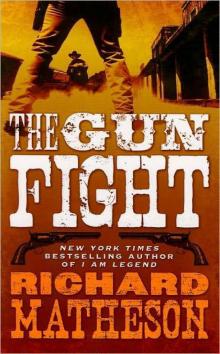 The Gun Fight
The Gun Fight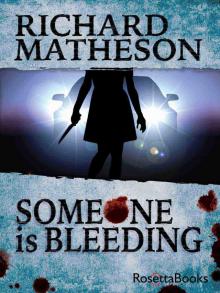 Someone Is Bleeding
Someone Is Bleeding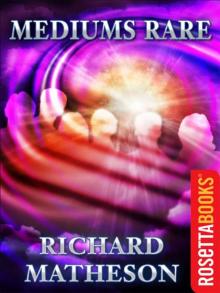 Mediums Rare
Mediums Rare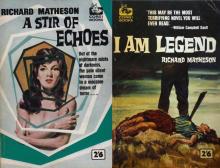 A Stir of Echoes
A Stir of Echoes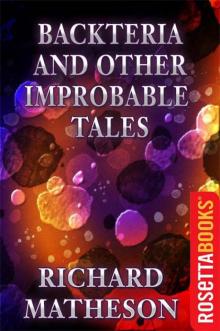 Backteria and Other Improbable Tales
Backteria and Other Improbable Tales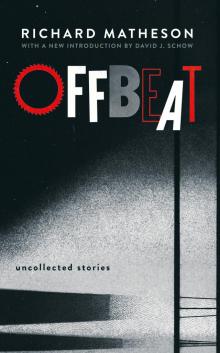 Offbeat: Uncollected Stories
Offbeat: Uncollected Stories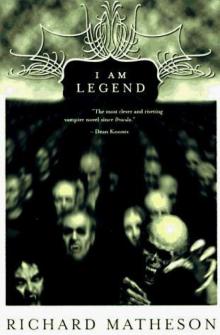 I Am Legend and Other Stories
I Am Legend and Other Stories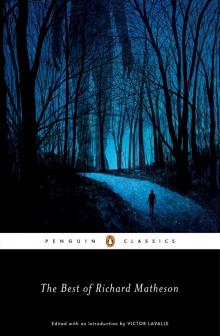 The Best of Richard Matheson
The Best of Richard Matheson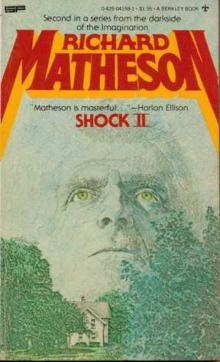 Shock II
Shock II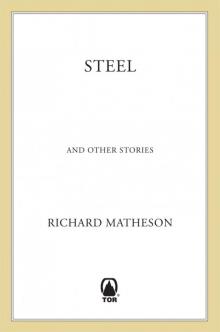 Steel: And Other Stories
Steel: And Other Stories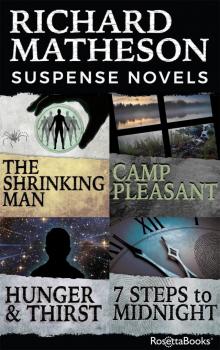 Richard Matheson Suspense Novels
Richard Matheson Suspense Novels The Link
The Link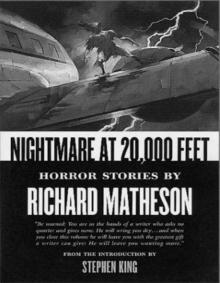 Nightmare At 20,000 Feet
Nightmare At 20,000 Feet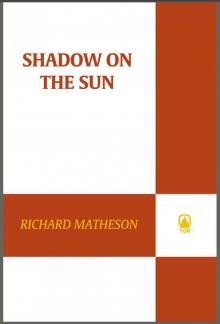 Shadow on the Sun
Shadow on the Sun![Steel and other stories [SSC] Read online](http://i1.bookreadfree.com/i/03/21/steel_and_other_stories_ssc_preview.jpg) Steel and other stories [SSC]
Steel and other stories [SSC] Created By
Created By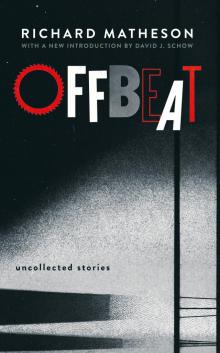 Offbeat
Offbeat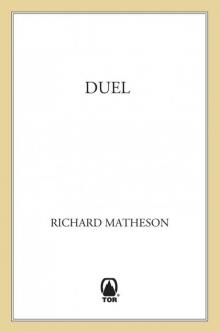 Duel
Duel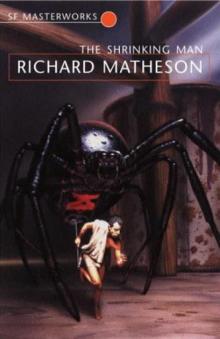 The Shrinking Man
The Shrinking Man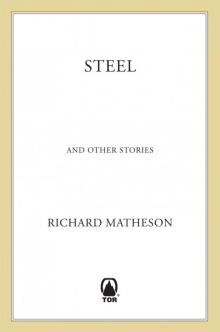 Steel
Steel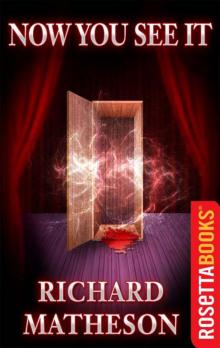 Now You See It
Now You See It